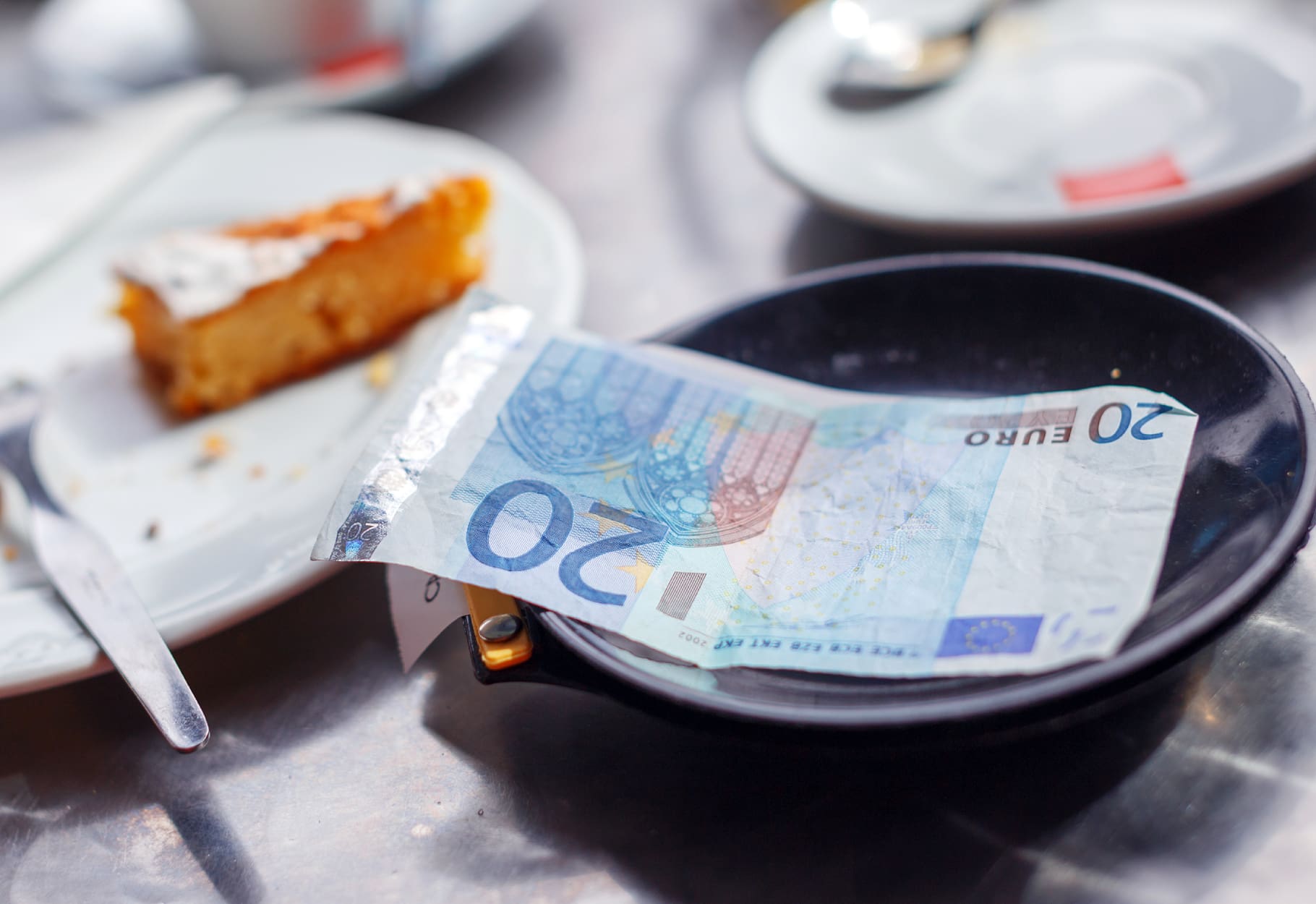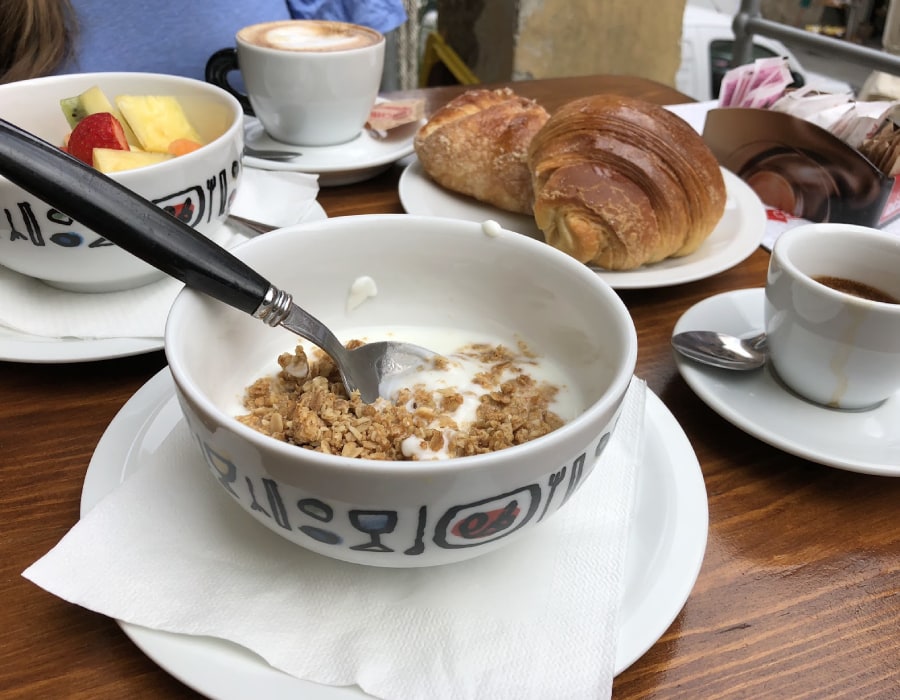How Much To Tip In Europe

Tipping in Europe is confusing since each country has its unique tipping customs and culture. This guide to tipping in Europe will cover everything travelers need to know about gratuity and tipping in restaurants and bars throughout Europe to ensure you’re not paying too much (or too little) when dining out.
General Advice For Tipping In Europe

Contrary to popular belief, tipping is a thing in Europe but it’s rarely “expected” and the tipping amount is much less than in America. Even in countries where tipping is culturally common, there is very little consensus about what’s a “normal tip” and many Europeans never leave any tips.
Restaurants in Europe often include a “service fee” in the final bill so any additional tip would be for service that went above and beyond.
Remember, waitstaff doesn’t rely on their tips for their wage like they do in the US since they’re paid a living wage and everyone gets benefits like healthcare, paid vacation time, etc.
Don’t Be “Pressured” To Tip (Especially For Americans)
As Americans, we’re expected to tip 18%-22% basically every place we get food or drink (and the percentage seems to be inching up every year).
And we’ve brought this tipping culture with us as we travel to Europe so the waitstaff in many European restaurants see Americans as walking ATMs. Some waiters might even go out of their way to mention that the tip isn’t included in the bill—however, they’d never say this to a local because they’d get laughed at.
Here’s my rule: If I’m asked to tip, then I don’t tip.
So don’t ever feel pressured to tip.
Quick Tips On Tipping
A 10% tip in much of Europe is considered generous at most restaurants so anything more than that is excessive. It’s also very common to simply round up to the nearest whole number—like leaving €30 for a €27 meal or €25 for a €24 bill.
However, the tip percentage typically decreases on large restaurant bills. For example, if your final bill is €200 then you might only tip €10-€15 but if you loved everything then feel free to do the full 10%.
Cash tips are always preferred—even when you pay with a credit card (the restaurant owners sometimes don’t give out tips that are paid via card).
But if you don’t have cash for a tip then you can always tip with your card.
If you want to tip with your card then you have to tell the waiter the amount you want him/her to charge you and they’ll key that amount into their credit card machine. Most restaurants in Europe don’t give you a receipt to sign—you simply get your card charged so you have to tell them the full amount upfront.
For example, if the bill is €23 you would tell the waiter to charge you €25 if you wanted to leave a €2 tip. Sometimes you’ll be handed the credit card machine to input your own tip amount but that’s still not widely done.
Restaurant Tipping Customs In Europe By Country

Each country in Europe has its own tipping culture so keep reading below for country-specific advice.
Tipping In Austria
Assuming there isn’t a service charge already added to your bill, most Austrians tip around 5%-15% with 10% being perfectly acceptable. On cheaper meals, you should just round up to the next euro amount (or just add an extra euro).
For example, a common tip for small bills (less than €100) is around 5-10% with a focus on rounding to the next “flat” amount. It’s standard to tip 10%+ in higher-end restaurants where the service is expected to be better or if you’re dining with a larger group.
Tipping In Belgium
There isn’t a huge tipping culture in Belgium but it’s fairly common to round up to the next even amount when paying the bill with cash. Some people might add 5-10% if they liked the service or throw an extra €1-€2 to the bartender at the end of the night (not per drink).
Tipping In The Czech Republic
Many restaurants in tourist-heavy parts of town will include an 8%-10% service fee to the bill so an extra tip isn’t expected but many people still round up to the next even amount.
If there isn’t a service fee, then a 5%-10% tip is fairly standard if you thought the service was good. It’s also common to simply round up to the next logical whole number—so rounding your 55czk coffee to 60czk or a 275czk lunch would be rounded up to 300czk.
Tipping In England
Many restaurants in England automatically add around a 12%-15% service charge to the bill so tipping isn’t necessary or expected in those cases. Otherwise, a 10% is always appreciated.
Tipping bartenders isn’t expected but it’s common for locals to “buy” their bartender a drink if they’re having multiple rounds. Again, this isn’t a tip for every drink kind of thing.
Tipping In France
Waitstaff in France are paid a living wage so virtually every restaurant in France will include a 15% service fee into the final bill. If you had great service, you can round up to the next full euro amount but it is completely optional.
Don’t be surprised if you’re asked or prompted for a tip at touristy restaurants but there is zero obligation to pay extra since waitstaff only asks tourists for tips.
Tipping In Germany
In Germany, the service charge is included in the final restaurant bill but a 5%-10% tip or rounding up is customary.
Fun fact, tipping is called Trinkgeld in Germany—which translates to “drinking money“. So again, it shows that waitstaff in Germany doesn’t rely on tips as part of their wage… it’s just a nice little extra.
Tipping in Greece
The service fee is built into the price so tipping at restaurants isn’t expected in Greece. But many people still either round up or leave €1-€2 (maybe a little more if it’s a large meal).
Tipping in Hungry
Restaurants in Hungry often include a 10-15% service fee in the final bill so you’re not expected to tip extra. However, it’s customary to either round up or do a max tip of 10%.
Tipping In Ireland
Many restaurants in Ireland add the service fee into the final bill so there is no need to add anything extra. But if you had excellent service then a 10% tip is plenty. You typically don’t tip a bartender unless they’re bringing drinks to your table but a euro or two at the end of the night is appreciated.
Tipping in Italy
Expect to see a service charge of 10%-15% automatically added to your final bill so don’t feel like you need to add anything extra. Rounding up a couple of euros is always appreciated (never more than 10%) but it’s never expected.
Tipping In The Netherlands
Restaurants usually add ~10% to the bill as a service but it’s fairly common to tip 5%-10% for good service. Rounding up the bill in bars is fairly common but again none of this is expected.
Tipping In Poland
There isn’t a big tipping culture in Poland but leaving a little extra for the waiter (in cash) is always appreciated.
Tipping In The Portugal
Some restaurants might automatically add a small service fee but there isn’t a normal “percentage” people typically tip. It’s most common to round up the bill or leave €1-€3 for your meal.
Tipping In Scandinavian Countries (Denmark, Finland, Iceland, Norway, and Sweden)
Tipping isn’t expected in Scandinavian countries but many locals will round up to the nearest whole banknote if they’re paying cash. Some might tip if they’re very happy with the service but 10% would be considered very generous.
Tipping In Scotland
Many restaurants in Scotland add a 10%-12% service charge so an extra tip isn’t expected. Many locals tip around 10% in a restaurant with table service but by no means is it required—especially if there’s a service fee automatically added.
Tipping In Spain
There isn’t much of a tipping culture in Spain so there is no expectation of a tip. It’s common to round up to the nearest whole Euro (i.e. tip €2 on a €48 bill) or leave €1-€2 in coins but many locals don’t tip anything.
Tipping In Switzerland
Most restaurant bills have a small service charge included but leaving a small tip of 5-10% is fairly common in restaurants.
More Ways To Save Money While Visiting Europe

I’m all about finding ways to save money while traveling around Europe so here are a few articles I’ve written to help you save some cash:

No Funny Business
The Savvy Backpacker is reader-supported. That means when you buy products/services through links on the site, I may earn an affiliate commission—it doesn’t cost you anything extra and it helps support the site.
Thanks For Reading! — James
Questions? Learn more about our Strict Advertising Policy and How To Support Us.

